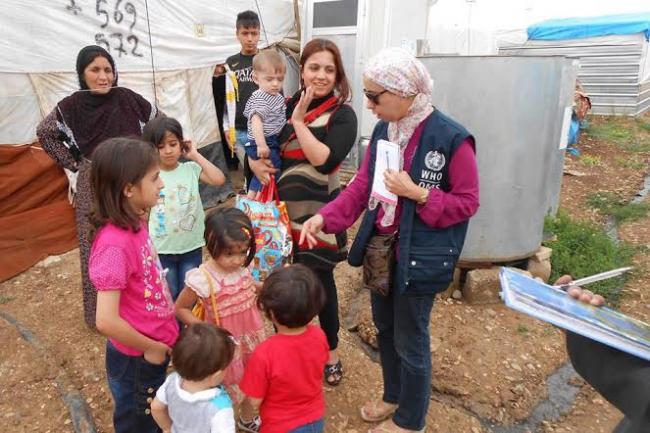04 Nov 2015, 05:49 am Print

According to a press release issued by WHO, the two-dose campaign is a part of a strategy to prevent transmission in high-risk areas and avert a potentially large-scale cholera outbreak in the 62 camps for refugees and internally displaced people.
The United Nations agency reported that the preparation for the campaign has now reached its final stages in 14 governorates and added that the campaign will begin with an initial round of vaccinations during the first week of November followed by,- after, as required, a minimum 14 days' interval- a second round of doses, which will complete the vaccination.
WHO stressed that the campaign can only be effective if the second dose is administered along with targeted social mobilization, campaign logistics and health education and further said that to ensure herd immunity, all members of a family above one year of age will be vaccinated.
According to WHO, an OCV is proven to be effective and can protect individuals by 85 per cent in the short-term and 65 per cent over 5 years with a good safety profile.
The UN agency said that evidence shows that high coverage of OCV in the target population can result in significant reduction of disease transmission in the vaccinated communities.
The cholera outbreak in Iraq reportedly started on 15 September 2015, according to WHO. Further, the UN agency said that as per the Ministry of Health (MoH) statistics, 2173 laboratory confirmed cholera with 2 deaths from 15 out of 19 governorates.
WHO said that the Ministry of Health of Iraq decided to use OCV in early October 2015, to prevent a potential cholera outbreak in the camps and to supplement the existing preventive measures, following an assessment conducted by the two groups to identify the high-risk groups and priority areas to be used the cholera vaccination.
However, WHO observed that the trend of cholera cases has been declining in the last 2 weeks, although some of the central and southern governorates namely are still reporting confirmed cases.
According to the UN agency, over the last 7 days, only one confirmed cholera case was reported from the northern governorates which comprise Kirkuk, Erbil, Dahuk and Suleimaniyah.
WHO said that it has been supporting the MoH and partners “to scale up the cholera response interventions, including the establishment of C4 coordination mechanism, enhanced early warning surveillance, improved case management practices, water quality monitoring and chlorination, improved sanitation and hygiene practices in high-risk areas, risk communications and prepositioning cholera supplies in strategic places”.
Lastly, the UN agency said that it has deployed epidemiologists from the headquarters and regional office, as well as experts since the outbreak was confirmed, in order to ensure to ensure that effective surveillance, case management and infection control and laboratory support are in place.
WHO added that it has donated adequate medical supplies to the Ministry of Health and facilitated the distribution of these supplies to treatment facilities across the country.
Photo: WHO Iraq
- Alarming projection: Global breast cancer cases could cross 3.5 million by 2050, shows study
- Exam stress to emotional distress: Study reveals the dark side of academic pressure
- Vegetarian diet linked to lower risk of five major cancers, study finds
- Ukraine’s health system under fire: Attacks spike 20% in 2025, WHO warns
- A dog’s loving lick turned deadly — She woke up without her limbs





-1763561110.jpg)
